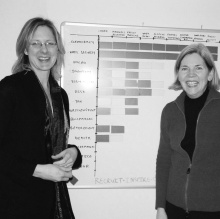History
As a doctoral candidate at Yale University in the 1980s, Tobin Project founder David Moss had the opportunity to spend time with Professor James Tobin, the 1981 Nobel Laureate in Economics. Over informal lunches at a New Haven diner, Professor Tobin often expressed his deep belief in the importance of publicly minded scholarship, emphasizing that the talents of America’s leading social scientists ought to be devoted to questions of pressing real-world importance. Increasingly aware that academic incentive structures did not always facilitate this kind of work, David emerged from these discussions motivated to find a way to engage with scholars who sought to direct their academic talents and resources toward questions that greatly mattered to society.
In 2004, as a professor at Harvard Business School, David found that many of his colleagues and peers at other universities were concerned about the health of the country’s economy and wanted to pursue research that could contribute to addressing this problem and other national challenges. Motivated by a firm belief in the power of ideas, and seeking to create a space where scholars could conduct research that was both rigorous and policy-relevant, David founded the Tobin Project and partnered with Professor Arthur Segel of Harvard Business School to build the organization beginning in 2005.
With no comparable organization as a model, the early leaders of the Tobin Project started by developing an interdisciplinary network of scholars who participated in twelve issue-based working groups. By 2007, in collaboration with these scholars and a growing network of policymakers, the organization had identified five primary research areas encompassing the central themes and questions emerging from its early efforts: The Economic Role of the State; Risk, Government, and Society; Inequality and Mobility; National Security; and American Identity and Ideals.
Under the leadership of David, Arthur, and its first Executive Director, Mitch Weiss, the Tobin Project developed a network of scholars and policymakers who came together for conferences, small meetings, working groups, and publication projects to develop research agendas focused on strategically important questions and to pursue new scholarship to address these questions. By 2008, the Tobin Project had grown its staff to seven and had further refined its focus to four key areas of inquiry: Government and Markets, Economic Inequality, Institutions of Democracy, and National Security.
These four areas continue to guide the Tobin Project’s work, with affiliated scholars and Tobin staff continuously developing and refining research questions and programming activities. To date, the Tobin Project has hosted eight major conferences, produced eight books, built its scholar and policymaker networks to over 1,000 participants, and enabled scholars to directly influence policy formation. More broadly, the Tobin Project has developed a proven model for developing strategic questions, generating academically rigorous research on major societal problems, and disseminating new ideas to policy audiences and throughout academia for continued impact over the long term.


